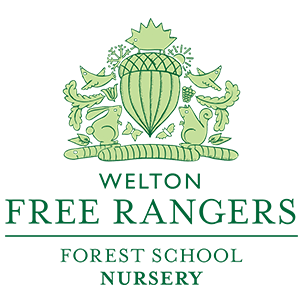Here at Free Rangers we believe that the great outdoors provides the children with high stimulating experiences, and gives them a great opportunity to develop their learning further. The Forest School ethos underpins all that we do here at Free Rangers.
The 3 principles of Forest School are:
- Using nature to provide a real context for learning
- Using children’s preferred learning styles, being active, learning through practical outdoor experiences and employing all their senses
- Using nature’s resources to facilitate learning
Forest School is a holistic way of learning by connecting with the natural surroundings and environment. In the Warren, we are happiest when outdoors: whether we are exploring the toys in the baby garden, walks around the farm, or making discoveries in the local area; cycle track or the park. We love to go on mini beast hunts around the farm. We enjoy building our confidence and gaining new skills when navigating along the obstacle course or climbing the mud slide. We spend time in the Fort, climbing up the steps or the tree stumps to climb to the top where we spend time looking and talking about the environment, focusing on what we can see and hear; thus stimulating our senses.
The majority of the activities that we take part in on a daily basis have elements of risk. As practitioners, we look at risk benefits. This is where we look at both, the ‘risk’ of the activities and focusing on the flip side, the benefits to the children, for example.
Climbing on a wooden balancing bean
Risk:
- Falling off and obtaining an injury (low risk)
Benefits:
- Developing gross motor skills
- Developing the ability to manage own risks solving problems
- Gain self confidence
- Developing emotional wellbeing
This demonstrates how the benefits out way the risks, therefore this activity is of low risk and the babies gain a lot from the experience they have encountered.
The babies took part in this activity: as a practitioner, you really see the benefits when the babies are problem solving. For example. You visibly see their ‘cogs turning’ when they are working out how to walk along the beams after they have managed to crawl the length of the beam. We also like to take it to the next level and manage a more challenging risk. This activity developed the babies’ gross motor skills: simultaneously, the babies use both arms to pull themselves up, whilst manoeuvring their legs to enable them to stand carefully, we praise the babies’ lots which provides a positive environment to develop their self-confidence and encourages them to feel proud and have a sense of achievement.
There are many risks at Free Rangers: climbing on the equipment, walking on the uneven ground, and avoiding stinging nettles and brambles are just a few. Allowing the babies and children to explore and manage their own risk-whilst learning about what may happen-gives them a greater understanding of the wider world. All if which link to the outcomes of the Early Years Foundation Stage.
I hope this has given you a greater insight to risk benefits at Free Rangers.
Thanks you for reading
Lou
